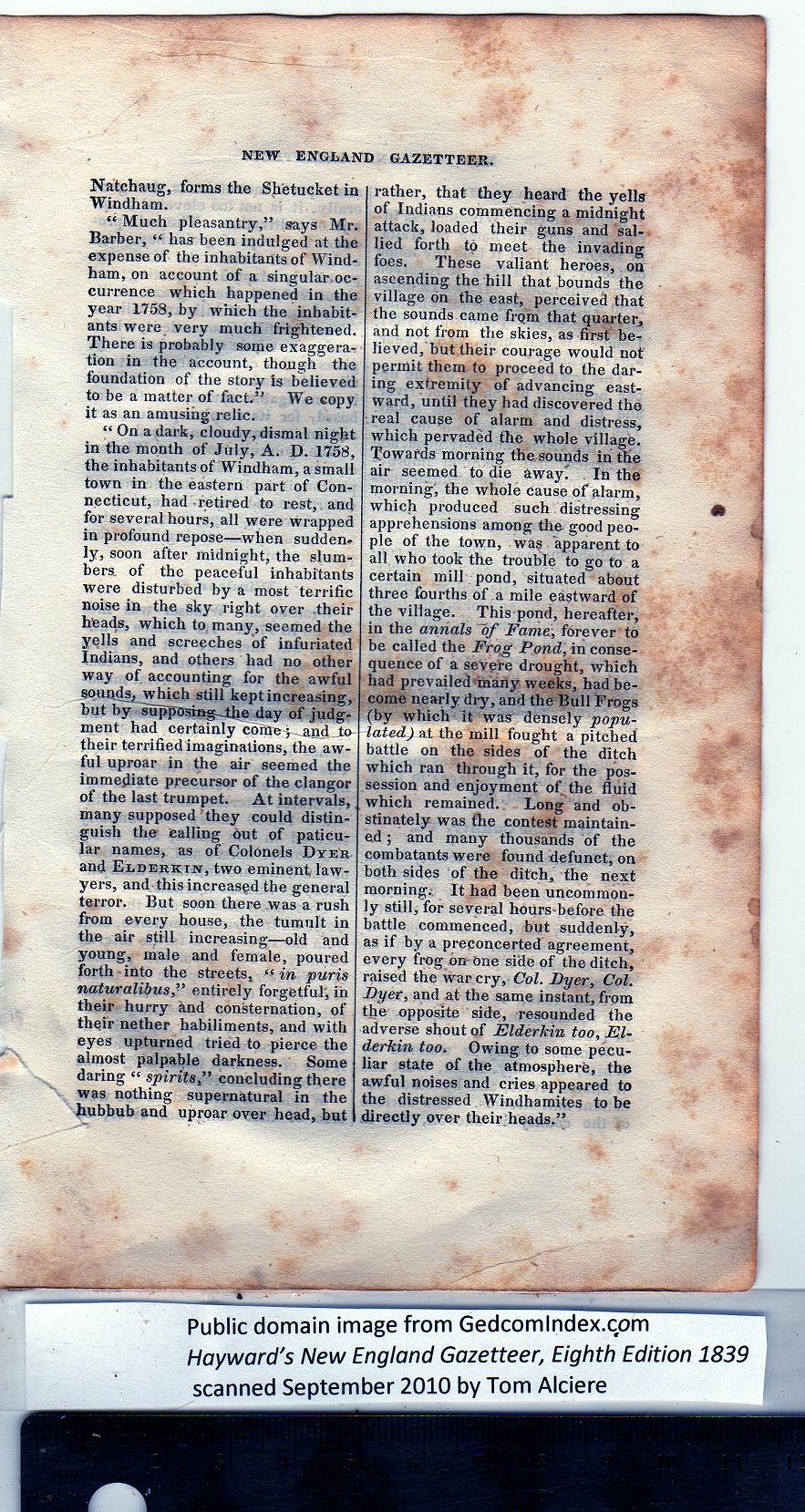|
Natchaug, forms the Shetucket in
Windham.
“ Much pleasantry,” says Mr.
Barber, “ has been indulged at the
expense of the inhabitants of Wind-
ham, on account of a singular oc-
currence which happened in the
year 1758, by which the inhabit-
ants were very much frightened.
There is probably some exaggera-
tion in the account, though the
foundation of the story is believed
to be a matter of fact.” We copy
it as an amusing relic. |
“ On a dark, cloudy, dismal night
in the month of July, A. D. 1758,
the inhabitants of Windham, a small
town in the eastern part of Con-
necticut, had retired to rest, and
for several hours, all were wrapped
in profound repose—when sudden-
ly, soon after midnight, the slum-
bers. of the peaceful inhabitants
were disturbed by a most terrific
noise in the sky right over their
heads, which to many, seemed the
yells and screeches of infuriated
Indians, and others had no other
way of accounting for the awful
sounds, which still kept increasing,
but by supposmg-dhe day of judg-
ment had certainly coftm j and to-
their terrified imaginations, the aw-
ful uproar in the air seemed the
immediate precursor of the clangor
of the last trumpet. At intervals,
many supposed they could distin-
guish the calling out of paticu-
lar names, as of Colonels Dyer
and Elderkijn, two eminent law-
yers, and this increased the general
terror. But soon there was a rush
from every house, the tumult in
the air still increasing—old and
young, male and female, poured
forth into the streets, (f in puris
naturalibusentirely forgetful, in
their hurry and consternation, of
their nether habiliments, and with
eyes upturned tried to pierce the
almost palpable darkness. Some
daring “ spiritsconcluding there
was nothing supernatural in the
hubbub and uproar over head, but
rather, that they heard the yells
of Indians commencing a midnight
attack, loaded their guns and sal-
lied forth to meet the invading
foes. These valiant heroes, on
ascending the hill that bounds the
village on the east, perceived that
the sounds came frqm that quarter,
and not from the skies, as first be-
lieved, but their courage would not
permit them to proceed to the dar-
ing extremity of advancing east-
ward, until they had discovered the
real cause of alarm and distress,
which pervaded the whole village.
Towards morning the. sounds ini the
air seemed to die away^ In the
morning, the whole cause of alarm,
which produced such distressing
apprehensions among the good peo-
ple of the town, was apparent to
all who took the trouble to go to a
certain mill pond, situated about
three fourths of a mile eastward of
the village. This pond, hereafter,
in the annals 'of Fame, forever to
be called the Frog Pond, in conse-
quence of a severe drought, which
had prevailed many weeks, had be-
come nearly dry, and the Bull Frogs
^by which it was densely popu-
lated) at the mill fought a pitched
battle on the sides of the ditch
which ran through it, for the pos-
session and enjoyment of the fluid
which remained. Long and ob-
stinately was the contest maintain-
ed ; and many thousands of the
combatants were found defunct, on
both sides of the ditch, the next
morning. It had been uncommon-
ly still, for several hours-before the
battle commenced, but suddenly,
as if by a preconcerted agreement,
every frog on One side of the ditch,
raised the war cry, Col. Dyer, Col.
Dyer, and at the same instant, from
the opposite side, resounded the
adverse shout of Elderkin too, EU
derhin too. Owing to some pecu-
liar state of the atmosphere, the
awful noises and cries appeared to
the distressed Windhamites to be
directly over their heads.” |
